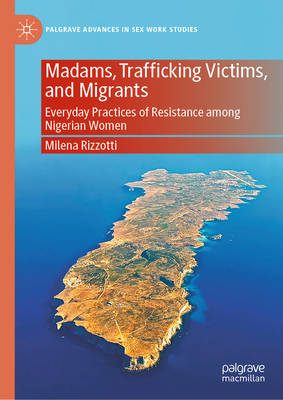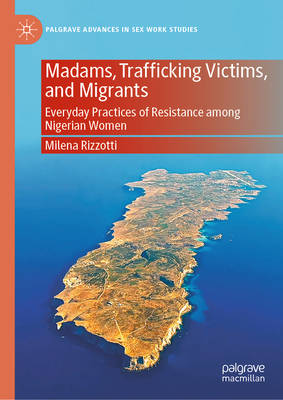
- Retrait en 2 heures
- Assortiment impressionnant
- Paiement sécurisé
- Toujours un magasin près de chez vous
- Retrait gratuit dans votre magasin Club
- 7.000.0000 titres dans notre catalogue
- Payer en toute sécurité
- Toujours un magasin près de chez vous
Madams, Trafficking Victims, and Migrants
Everyday Practices of Resistance Among Nigerian Women
Milena Rizzotti
138,95 €
+ 277 points
Description
This book examines Nigerian women's experiences of migration, work and mobility across European borders through a unique problematisation of the boundary between madams and victims. Rizzotti brings together the voices of women positioned by humanitarian categories on both sides of the trafficking divide to show how their trajectories are shaped by similar dynamics of debt, kinship and constrained mobility. The book reframes trafficking as a field of negotiation, where agency and constraint coexist within women's strategies of survival. It stands as an essential reference for anyone seeking to understand and rethink the gendered and racialised dynamics of trafficking, migration, and border control. Dr Nicola Mai, Professor of Criminology, University of Leicester, UK Despite the extensive research on trafficking from Nigeria to Europe, much of the existing knowledge remains victim-centred and rooted in the field of social assistance. This focus has been crucial in shaping our understanding of the anti-trafficking landscape--particularly in highlighting which aspects of victims' experiences are prioritised by institutions when assessing claims for humanitarian protection. However, it has also resulted in a narrow perspective, largely limited to the narratives of individuals who have been officially recognised as victims. Rizzotti's book reconfigures established understandings of trafficking by incorporating the voices of convicted women, alongside those of identified victims and key stakeholders. Her fieldwork illuminates the ways in which Nigerian women resist and navigate the constraints placed on their social and geographical mobility--constraints often reinforced by institutional labels such as "trafficker" and "victim"--in order to pursue individual and collective migration goals. Rizzotti demonstrates that both convicted women and identified victims frequently share similar experiences and aspirations, particularly in their efforts to overcome restrictive migration regimes and gendered expectations imposed on them as racialised migrants from the Global South.
Spécifications
Parties prenantes
- Auteur(s) :
- Editeur:
Contenu
- Nombre de pages :
- 194
- Langue:
- Anglais
- Collection :
Caractéristiques
- EAN:
- 9783032097118
- Date de parution :
- 06-02-26
- Format:
- Livre relié
- Format numérique:
- Genaaid
- Dimensions :
- 148 mm x 210 mm

Seulement chez Librairie Club
+ 277 points sur votre carte client de Librairie Club
Les avis
Nous publions uniquement les avis qui respectent les conditions requises. Consultez nos conditions pour les avis.





